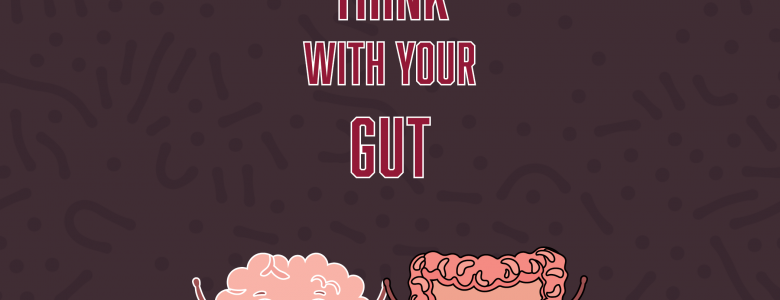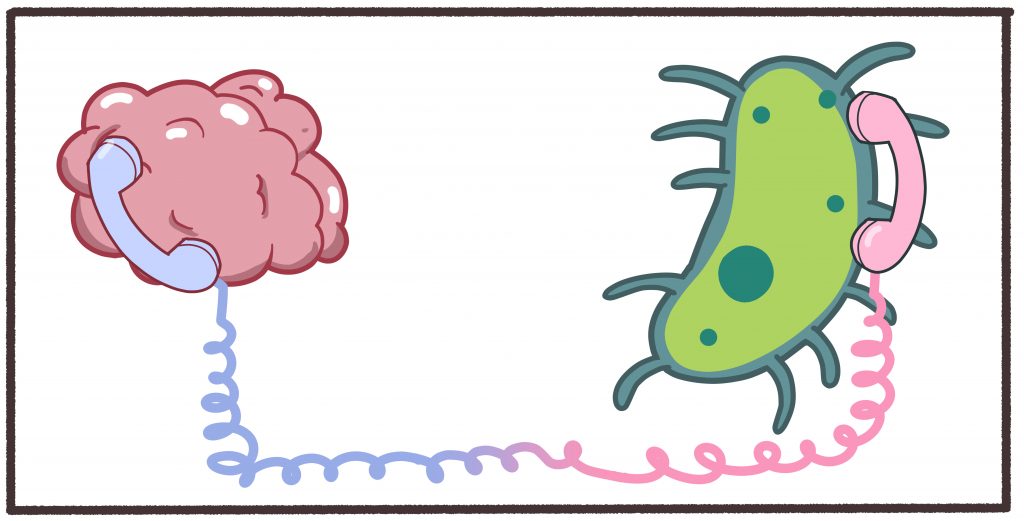June 6, 2020
Think With Your Gut

By: burgundy bug
Think with your gut
Source: The Burgundy Zine
Our bodies are essentially an apartment complex for 100 trillion micro bacteria that have found a home within our intestines.
Before you start writing up an eviction notice, it’s worth noting just how much we – and every other organism with a digestive system – depend on gut microbiota.
Recent research shows gut microbiota influence our mood, behavior, and neurodevelopment. While it may seem these microscopic critters run our lives, the gut microbiome is largely influenced by environmental factors including diet, stress, geography, and age, among others.
Instead of accusing your gut microbiota of being bad tenants, ask yourself: “Have I been a good landlord? What are they trying to tell me?”
Learn to think with your gut, not against it.
The gut microbiome and brain have a symbiotic relationship that’s widely misunderstood and has only recently become a major focus of neuroscience, according to a 2016 review in Chinese Medical Journal.
“Gut microbiota can play an important role in brain behavior and cognitive development by producing hormones, immune factors, and metabolites, which also indicated that altering the gut microbiota may improve or even cure brain diseases,” the review says.
Microbiome Demographics
The human microbiome itself is an incredibly diverse community, composed of over 5,000 strains of microbes and more than 1,000 unique variants of microflora.
That may sound like a lot, but considering the population, it makes perfect sense: “There are an estimated 100 trillion bacteria in an adult’s body, 80 percent of which exist in the gut, about ten times as many cells in the human body,” the review explains.
The gut microbiome hosts more than 100 bacterial species, all of which encode 150 times the amount of genes that are in the human genome.
Babies receive the initial microbiome from their mothers. How you were born (vaginal v.s. C-section) and how you were fed (breastfed v.s. formula) affect the first gut microbiota to colonize, according to a 2018 Current Neuropharmacology study.
How you were cared for as an infant also affects your gut microbiome, the Chinese Medical Journal review explains.
“Stress in the first few years of life could lead to the change of microbiota, and this is a risk factor for stress-related disorders in adulthood,” the review explains.
In animal studies, maternal separation and prenatal stress lead to long-lasting changes in the gut microbiome.
Other stress factors, what you eat, where you live, your age, metabolites, genes, and your use of anti-biotics also affect your gut microbiome.
What’s the Purpose of Gut Microbiota?
The gut microbiome is a complex community, with each of the microbiota working together to maintain metabolic balance.
They exert multiple functions throughout the body, serving as an intestinal barrier, aiding the maturation of the immune system, and removing poison as well as drugs from the body.
Microbiota also synthesize and metabolize nutrients, hormones, and vitamins.
The Gut-Brain Axis
“Studies on the influence of gut microbiota on the brain have been increasing, and the gut microbiota-brain axis has become one of the focuses of neuroscience.”
Gut Microbiota-brain Axis | Chinese Medical Journal
Gut microbiota influence the brain through the neural network, neuroendocrine system, and immune system, the review says.
However, the method of two-way communication has yet to be fully understood. After all, their connection has only become a recent interest of study.
So far, we know they can interact through two neuroanatomical pathways. One is a mutual conversation through the autonomic nervous system and vagus nerve system. Another is through the enteric nervous system in the gut (a.k.a. the brain in your gut) combined with the ANS and VN in the spinal cord.
The brain and gut literally feed information to each other, and these discussions have a ripple effect throughout the entire body.
Gut Microbiota and Neurotransmitters
“The gut microbiota – the trillions of bacteria within the gastrointestinal tract – has been found not only to be an essential component [in] immune and metabolic health, but also seems to influence the development and diseases of the enteric and central nervous system, including motility disorders, behavioral disorders, neurodegenerative disease, cerebrovascular accidents, and neuroimmune-mediated disorders,” a 2018 Brain Research article says.
In short:
- Motility disorders include: gastroesophageal reflux disorder, intestinal obstruction, small bowel bacterial overgrowth, constipation, diarrhea, fecal incontinence, and gastroparesis.
- Behavioral disorders include: attention-deficit hyperactivity disorder, emotional behavior disorder, oppositional defiant disorder, anxiety, and obsessive-compulsive disorder.
- Neurodegenerative disorders include: Alzheimer’s disease, dementia, Parkinson’s disease, prion disease, Huntington’s disease, spinocerebellar ataxia, and spinal muscular atrophy.
Once again, it appears to take two to tango when it comes to gut microbiota and neurotransmitters. While gut microbiota produce a substantial amount of neurotransmitters, they’re also affected by various neurotransmitters.
For example, E. Coli appears to grow at an increased rate in the presence of dopamine and norepinephrine. Other gut bacteria also appear to grow in the company of norepinephrine.
Simultaneously, many gut microbiota appear to produce norepinephrine – but dopamine production from gut microbiota is still under investigation.
Serotonin is widely used throughout the body to regulate stress, mood, memory recall, sleep, digestion, blood pressure, and body temperature – but 90 to 95 percent of it is located in the gastrointestinal tract.
Read: The Role of Serotonin in Your Daily Life
The Burgundy Zine
In germ-free hosts (sterile lab animals with no gut bacteria) there’s a significant reduction of serotonin in the bloodstream.
The connection between gut microbiota and GABA – a neurotransmitter involved in CNS, behavioral, pain, and sleep disorders – is one that has been a bit more explored. Gut microbiota can consume or produce GABA, but their exact effects are still a bit mysterious.
Dietary interventions are “well known for their ability to alter” the gut microbiome. In the case of the keto diet, GABA levels were shown to increase, which improved symptoms of children diagnosed with epilepsy, the article explains.
In a recent fecal transplant study referenced in the article, GABA levels were the most altered metabolite in obese patients who received transplant from “lean donors.” This was associated with “improved insulin sensitivity.”
Gut Microbiota in Autism and Mood Disorders
“Up to now, the impairment of gut microbiota plays a key role in the development of autism and mood disorders,” says a 2016 World Journal of Gastroenterology review. “The application of therapeutic modulators of gut microbiota to autism and mood disorders has been experienced only in experimental settings to date, with few but promising results.”
Recent studies show a correlation between gut microbiome imbalance (dysbiosis) and obesity, allergies, autoimmune disorders, irritable bowel syndrome, inflammatory bowel disease, and psychiatric disorders, the review continues.
One of the markers of gut microbiota in conditions like schizophrenia, major depressive disorder, and bipolar disorders is the “inflammatory state alteration.”
The gut microbiome dysbiosis that correlates with these conditions releases a pro-inflammatory molecule into the bloodstream that affects the central nervous system. This affects areas in the CNS responsible for emotional control.
“However, this influence is not unidirectional, but is a continuous communication: the CNS is able to change the composition of microbiota,” the review says.
The role of gut microbiota in autism spectrum disorders remains unclear, but multiple hypotheses have been pitched. Some researchers have proposed the microbiota that colonize in individuals with ASD produce neurotoxins that contribute to some of their symptoms.
In depression, “a correlation with gut microbiota is emerging,” the review says. Microbiota can influence neurotransmission in the CNS, which has been seen to influence depressive symptoms in studies on mice.
In clinical studies, patients with depression appear to have an overexpression of the same microbacteria – Alistripes, which is in the same family of microbacteria detected in patients with chronic fatigue syndrome and IBS.
“Moreover, Alistripes has been linked to depression mood by generation of inflammatory molecules able to spread into the bloodstream,” the review adds.
In Conclusion
An illustration showing communication between microbiome gut bacteria and brain central nervous system
Source: Adobe Stock
Our brain and our tummies – well, the microbacteria crawling in our GI tract – are in constant communication. Their teamwork has a profound effect on our general wellness.
But let’s say one says something to offend the other, right? That “fight” can lead to various dysfunctions throughout the brain and body. Inflammation can start spreading through the bloodstream like wildfire, affecting your mood, sleep, and it can cause pain.
Which came first? The chicken or the egg? The state of gut microbiome dysbiosis or the diagnosis? While this question is still under the microscope, one thing’s for sure: the microbiota and the condition correlate.
Let’s take depression, for example. Did your dietary habits cause dysbiosis that gave you depression, or did your depression cause dysbiosis?
In any case, the lack of motivation to eat healthier continues the cycle of dysbiosis and depression. And it has been shown that dietary changes can alleviate the symptoms.
Lastly, the gut-brain axis is a newer area of study that has great potential for breakthroughs in gastroenterology and neurology.
“It is believed that the gut microbiota-brain axis will provide more information and possible route for people to know the brain, understand the brain, and protect the brain,” concludes the Chinese Medical Journal review.
Interested in working with Burgundy Bug? Learn more about commissioning her writing and art here!
Interested in having content featured in an upcoming blog post or issue of The Burgundy Zine? Head on over to the submissions page!
For all other inquiries, please fulfill a contact form.



